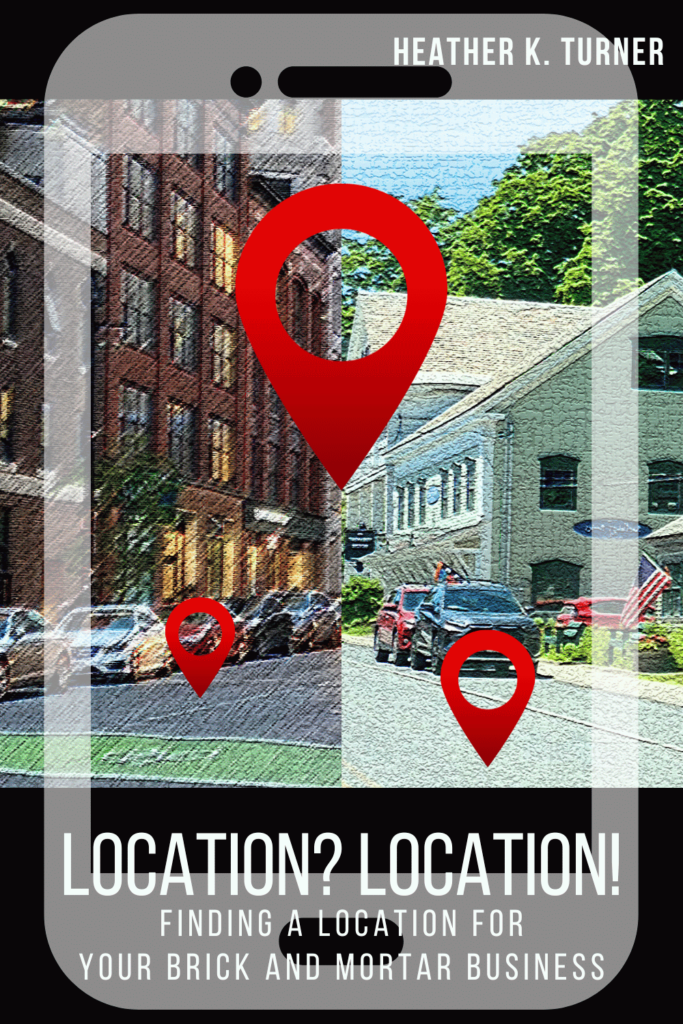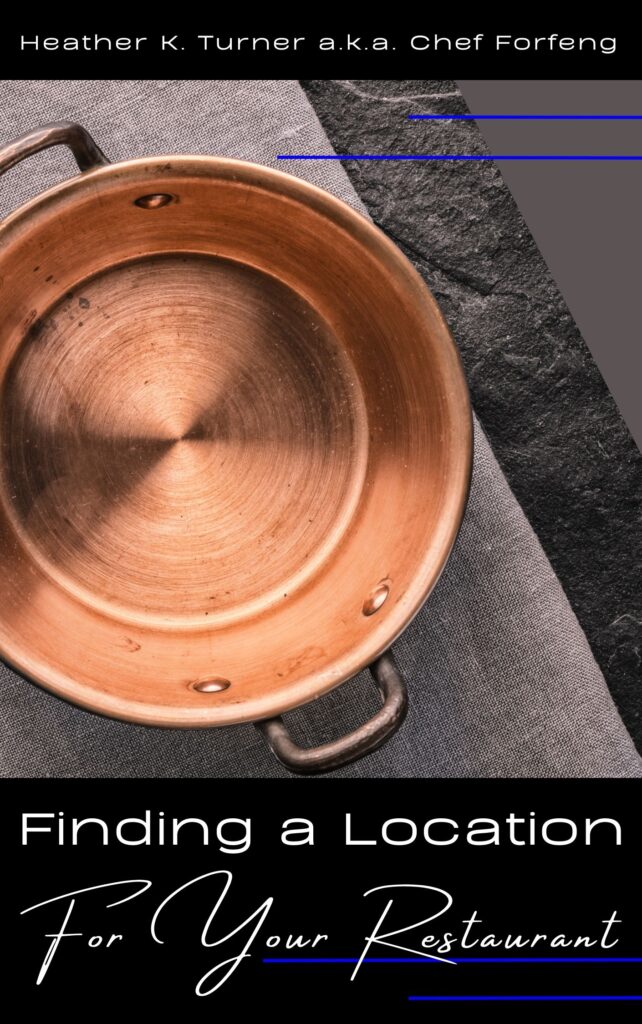by Heather T. | Apr 14, 2020 | Bed and Breakfasts, Blog, Lodging, Marketing, Social Media
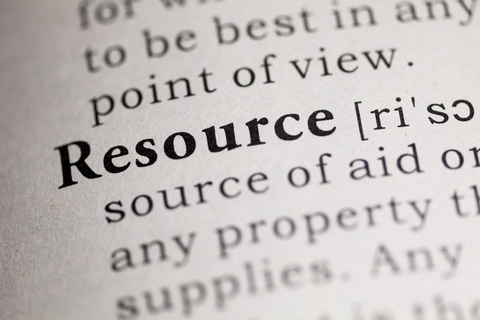 So I think I’ve sent these links out including the post ideas several hundred times within the last few weeks so thought if anyone else might find them useful, have at it. 🙂
So I think I’ve sent these links out including the post ideas several hundred times within the last few weeks so thought if anyone else might find them useful, have at it. 🙂
Resource Links for Social Media and other online tools I use quite a bit:
Canva
Youtube
Pinterest
Instagram
Twitter
Facebook
Linkedin
Google Docs & Spreadsheets Tutorials
To reduce Image File Size
Remove Image Background
CloudConvert File Converter
Free PDF editor & form filler (use the free online version)
Stock Photo Information
Model Releases (for adults and children)
25 Blogging ideas for Inns and B&B’s (also useful for things to tweet about or blog about or use for other social media) plus more underneath crisis related as hard sell advertising is not recommended right now.
- Recipes: recipes you use, recipes you’ve come across that sounded good that the inn is going to try at some point, recipes given to you by guests or friends (including other innkeepers).*caveat: No poaching of Google images, take the photos yourself or buy from a stock photo source or guests may have pictures to share with you (always credit them) Good images can be obtained for around a buck from stock photo sources. If the recipe is something you serve on a regular basis, highly recommended you take an actual photo or use stock that comes very very close to the real thing. I hope I don’t have to explain why ?
- Recipe failures with a funny story.
- Guest Comments.
- Your Inn in the News.
- Area attractions in the news.
- A frequent and Loyal Guest in the News.
- Specials and Packages at your inn. (wait until things are closer to opening up, but mention them as reminders)
- Area Attractions with contact information about the attraction, a weblink, directions and why its interesting.
- Area attractions reviews (including dining).*caveat: especially if its dining, make sure it’s a review that a recent guest or guests had and not your personal point of view, i.e. don’t piss off the locals that might refer you.
- Trip Itineraries for Guests, make a custom Google map pined with locations (this is free by the way and easy to use)
- Pictures of the inn: if it’s food give a title to it if it’s not accompanied by a recipe, if it’s a particular location in or around the inn, describe it.
- Pictures of happy guests, with their permission and preferably in writing. Customizable Model Releases in MS word. (link below)
- Area Events going on, you can also tie this into area restaurants having specialty diners or wine tastings.
- A brief, “we get frequent questions “about” and put in answers.
- What does your inn do to differentiate itself from the others.
- You just found a new product you are using it and love, be it food or a new fabric softener, describe it and explain why you love it.
- Funny guest stories. *caveat: make them funny and only funny, proof heavily to make sure they are not negative in any way. While a wife may go into the wrong room by mistake in the middle of the night may have very amusing consequences, it raises things like don’t they have locks on the doors? (even if you do and point out they didn’t lock them) etc. etc.
- Do some food specific reviews. You have a couple of apple orchards nearby. Do some write-ups on the apples, do some research on types of apples, link to sources.
- Research and write about area birds that come to and hang around the inns, pictures are always a plus.
- Research and do some write-ups about the area plants and trees in the area. You have a historic stand of black birches in the area, some history, background (and pictures) you grow opal basil in your inn garden, tie it into some recipes you use and write about the difference in taste and appearance between that and regular basil.
- Ask for feedback, from blog readers and from prior guests. You just went from goose down pillows to memory foam pillows. Ask for some thoughts from people; don’t forget to include the link to this blog article when you do your next email blast.
- A bio of yourselves and/or your staff.
- A book review or commentary about a local author.
- Suggestions for weather/time of year guests. i.e. August is prime season for ticks in New England, add tick repellent tips, wear white, use a good repellent (which we also keep extra of the at inn by the way) etc. etc. On hot muggy days our guests like to go to a cool shaded out of the way place to dip and bring a picnic (provided by the inn as an amenity of course).
- Targeted things to do, coming with an elder relative, they might like…. Coming with young children, they might like….Bringing your dog, you and your pup might like……
Originally on: 25 Blogging Ideas for Inns and B&Bs (and other posting channels)
Some Additional ones from recent blog posts (Covid Crisis)
- What you are doing or going to do in the community to help.
- Testimonials and reviews from past guests.
- Recipes you make normally (with lots of pictures) tie some quotes from past reviews in there too.
- If you are learning a new skill or more “about “something (highly recommended) write about it!
- Tips on recipes substitutions and also cooking recipes or tips that people can do with limited ingredients.
- Local news (and other news) of people reaching out and doing something nice for others. Everyone needs the positive right now.
- Photos of things in the inn, not necessarily rooms, but closeups and write a story about them.
- Photos of outside the inn, wide shots and closeups too, as Spring comes, flowers and other plants are going to be coming up and blooming, sharing beauty is always a positive. People need it and will continue to need it.
- Test recipes (if you are going to or can play with new ones) ask for feedback on posts, what do people think? Or just post the link and add some text.
- Do online cooking tutorials or demonstrations. Live stream it if you are up for it.
- Other skills or other hobbies you can share online
- If you have dogs or cats (or other animals) at your inn and you are not already using them for marketing, now is the time.
- Talk about some of the things you have in the inn and WHY you like them and use them.
Originally on Working towards future heads in beds and Restore, Engage, Aggregate, De-stress and You for Innkeepers
And ALP (Association of Lodging Professionals) will have something hopefully useful to help Innkeepers, stay tuned for an announcement on Wednesday afternoon……..
by Heather T. | Apr 2, 2020 | Opinion
 This has nothing to with innkeeping or restaurants but it might be helpful to anyone who is experiencing sadness, depression or just, in general, being down in the dumps.
This has nothing to with innkeeping or restaurants but it might be helpful to anyone who is experiencing sadness, depression or just, in general, being down in the dumps.
That, unfortunately, would be most of us right now, whether out of work, working at home or being stretched to the max and wishing they had invented cloning machines already (that would be me currently).
Ironically I’ve written more blog posts in the last few weeks then I have in months, writing even badly is therapy apparently when I’m stressed.
I count myself lucky that I belong to three Toastmasters groups who meet frequently and am welcome at thousands more clubs around the world as we all moved to virtual online meetings for a while. I get to see familiar faces, interact with them and generally have some fun and it’s excellent to do that but isn’t necessarily fulfilling my full need to interact and socialize with friends. I’m not a social butterfly but there are people I like to get together with and have a good laugh in an unstructured environment.
Last week was my papa-san’s birthday and while all of were social distancing, it’s not like we could go sing him a happy birthday, some relatives and I got on Zoom with him and did so, and then chatted for quite a while, and laughed and then went off on a tangent about science fiction (because we are all fans). What was supposed to be a half hourish call turned into almost 2 hours. I felt pretty good after that.
Today as I went to post some things on a client’s Facebook page, I see my aunt’s posted a meme, one which I can’t resist. “What’s your Dragon name: Your name backwards + the current mood + Hoarder of (the last thing you ate) and (item to your left)” and then I started to read the comments, *jane*The Frustrated Hoarder of,*jane*the Stressed Hoarder of,*john* the Anxious Hoarder of,*jane*the pissed off Hoarder of ,*john*the sad Hoarder of, *john*the tired Hoarder of etc and I “know” people are stressed, upset, stir crazy but for some reason that just hit home even more than usual.
 After the couple of weeks I’ve had, I said, “I need a laugh, badly” and posted on my personal page “Who’s online and wants to get together for a quick Zoom call and share a funny video together and laugh. I need a laugh right now. Direct Message me and will share my Zoom link”.
After the couple of weeks I’ve had, I said, “I need a laugh, badly” and posted on my personal page “Who’s online and wants to get together for a quick Zoom call and share a funny video together and laugh. I need a laugh right now. Direct Message me and will share my Zoom link”.
I only had a couple of people see the post and take me up it on but we watched a Carol Burnett Blooper reel on Youtube, together for 10 minutes and LAUGHED together. While I don’t feel 100% better (that would probably take some heavy-duty valium and a nice long Barbados vacation with lots of pina coladas at this point) I DID feel a damn sight better then I did before that.
Not everyone has webcams but most people do have smartphones, make a date with a couple of friends or a group of people and don’t talk (introductions maybe) and find some funny videos on Youtube or Facebook that you can screen share together and just laugh together. Use Zoom or some other application that works for you.
We are going to do it at least once daily and maybe more because laughter truly is the best medicine and seeing and more importantly HEARING someone else laugh is even more contagious then Covid-19 and that’s a good thing. Go forth and socialize and LAUGH!
by Heather T. | Mar 26, 2020 | Bed and Breakfasts, Blog, Lodging, Marketing, Opinion, Social Media
A followup post to Restore, Engage, Aggregate, De-stress and You for Innkeepers.
I’ve had many innkeepers ask if I could give some additional ideas for what to post online on social media beyond the above idea, so here goes…
Well, let’s see, posting to get people to make a reservation for most inns and B&Bs is pretty much a given that it’s not going to help right now unfortunately 🙁
So….what is an innkeeper to do? Here we have a captive audience of people at home, many using social media quite a bit more than normal, what do we post…..
You can certainly post soft-sell posts, which reference your inn, people staying or coming to stay at your inn and upcoming events. But there is quite a bit more you could consider doing. The key is getting your name, your brand and your B&B in front of the eyes now.
- What you are doing or going to do in the community to help. I know several B&Bs that have volunteered to help batch cook for soup kitchens. What can you or will you do to help. People love seeing people help the community and helping will come back in spades.
- Testimonials and reviews from past guests.
- Recipes you make normally (with lots of pictures) tie some quotes from past reviews in there too.
- If you are learning a new skill or more “about “something (highly recommended) write about it!
- Tips on recipes substitutions and also cooking recipes or tips that people can do with limited ingredients.
Local news (and other news) of people reaching out and doing something nice for others. Everyone needs the positive right now.
Example:

Photos of things in the inn, not necessarily rooms, but closeups and write a story about them.
Example:
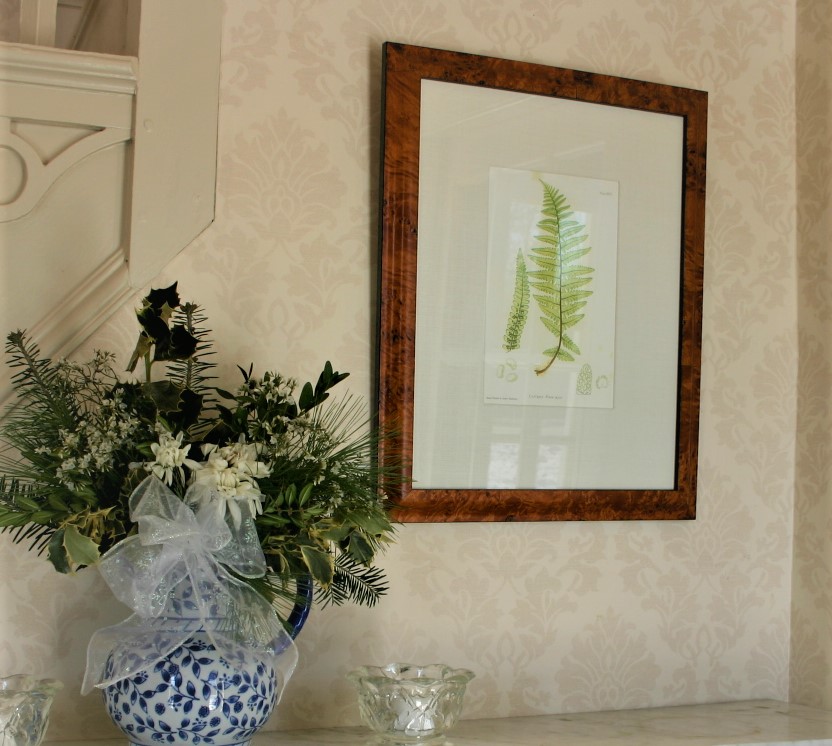
This great fern print was given to us several years ago by an artist that stayed with us for several days, she had come to speak at our local Audubon about edible wild plants. We love the local Audubon which has some great ongoing programs for the public, so when you come to visit us next make sure you check it out! Sharon Audubon Center https://sharon.audubon.org/
- Photos of outside the inn, wide shots and closeups too, as Spring comes, flowers and other plants are going to be coming up and blooming, sharing beauty is always a positive. People need it and will continue to need it.
Example:

- Test recipes (if you are going to or can play with new ones) ask for feedback on posts, what do people think? Or just post the link and add some text.
Example:

- Do online cooking tutorials or demonstrations. Live stream it if you are up for it.
Example:

- Do you have other skills or other hobbies you can share online?
Example:
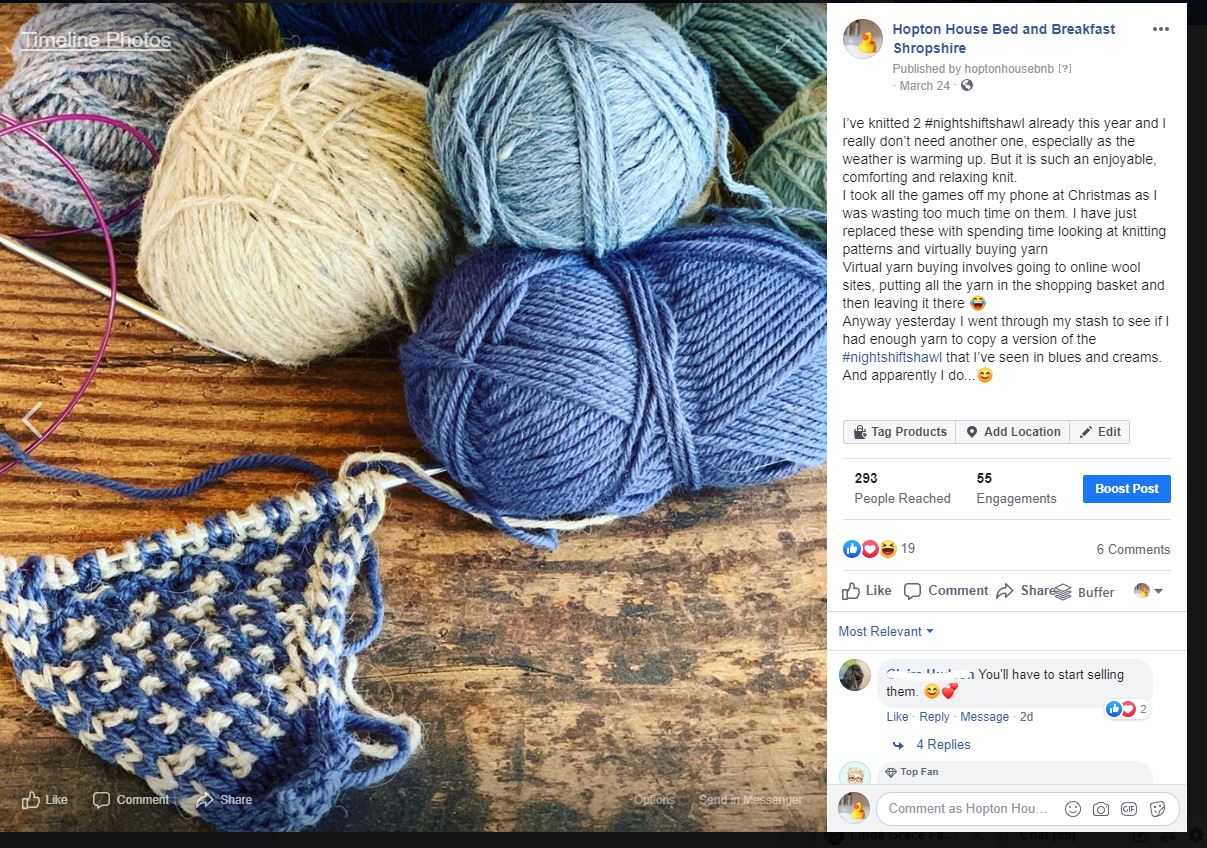
- If you have dogs or cats (or other animals) at your inn and you are not already using them for marketing, now is the time.
Example:
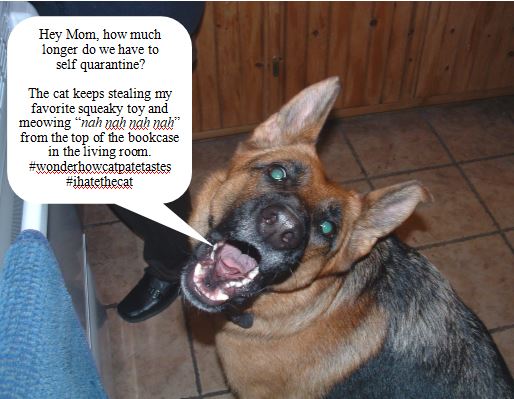
- Talk about some of the things you have in the inn and WHY you like them and use them. You use Molton Brown, do some posts about the products, give some history about it, tell people WHY you picked that line. You have a local painting company that you support, write some posts about them, help others and the return will come back when it’s time. (Don’t forget to take some pics from around the Inn)

While I normally steer innkeepers away from being too personal in their posts, yes you want some personality to come through and be engaging, but not share TMI (Too much personal information, I had someone ask me yesterday what that meant), speaking from the heart is not going to hurt here. This is community time, not sales time.
I think one of the bright spots in all of this hardship and I am already starting to see it locally and across professions and groups, is more people coming together (while practicing social distancing which is ironic) and working together for common goals and the common good. I hope that when all of this is passed, that this continues.
What can you do to get ahead NOW?
- Look through past posts on Facebook that were non-sales related or soft sale related and recycle them. Go ahead and mention it as a blast from the past post too if you would like.
- Get ahead and write up posts for when this is over, print out some marketing calendars and pre-select when and what days and times you are going to post.
This will give you a basis for how many and what kind of posts to come up with.
This is something innkeepers should be doing anyway but practicing this now if you are not already doing it, gets you into the gear of when things are back to normal and then you will hopefully start doing it automatically.
If nothing else at least do the holidays, any big events that you are pretty sure are going to still be on, i.e. after August? September? And any posts for specials or offers you do every year.
- So, if you do teas start getting ahead of pre-writing your posts and when we are back and busy again, you have them all set and maybe a little extra time to get ahead on future ones too at that point
- Get photos together, date them and label them, date the posts and put them in order, in a folder or folders where you can find them again and if you use the Facebook Scheduling tool, go ahead and schedule them in.
- Write up your posts in MS word, Notepad, Google docs or however you want to organize them, there is no bad or wrong way to do this.
Example:
Every year in the Lake Sunapee Area of New Hampshire, we have the Annual Craftsmen’s Fair. Usually, B&Bs and hotels and motels in the area are completely booked up. This year (if it happens, fingers crossed) it will be August 1st to the 9th, 2020. Hundreds of master craftsmen will showcase their one-of-a-kind arts and crafts at the Mount Sunapee Resort in Newbury, NH.
This is the kind of event that most properties will post online about at least once if not more leading up to the event. So, to use this “as an example”.
The start date is August 1st. In a normal season an inn would start posting about this mid-summer and in this particular case (depending on how things are going) we will stick with this for this example. I as an innkeeper want to get ahead of the game, I either have photos from past Craftmans fairs AND/OR I can buy them from a stock photo company AND/OR I can reach out to some of the 100s of craftsmen who will be there and request permission to use some of their photos and make sure it’s noted that you will be giving them credit and a link back to their websites.
You don’t have to follow this order or format, this is just to give you an example of pre-writing up posts to get ahead.
First post: We are so looking forward to the annual Craftman’s Fair this year. Last year we had guests from all over Etc. Etc.
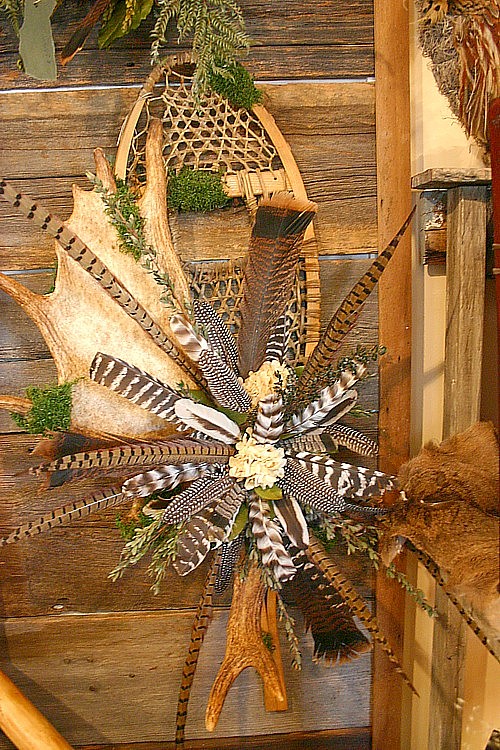
Second post: write about one of the artists, or do multiple posts about the artists, make sure you link to their websites and social media if they have them, Etc. Etc.
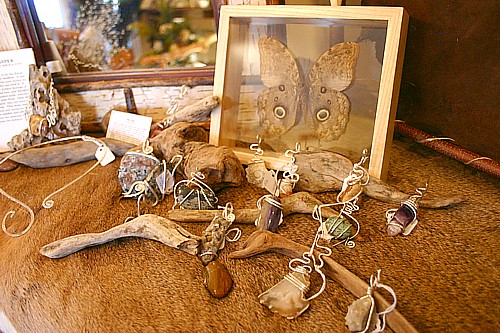
Third post, talk about something you bought for the inn last year from the fair (with photo or photos of same) Etc. Etc.
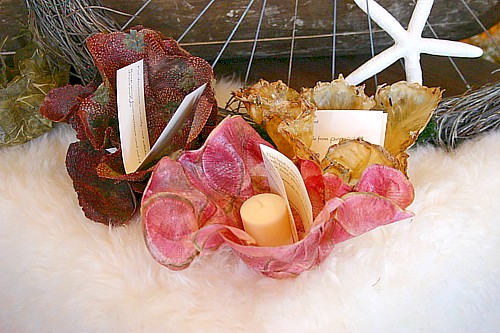
Fourth post, By the way we fill up fast, make your reservation soon Etc. Etc.
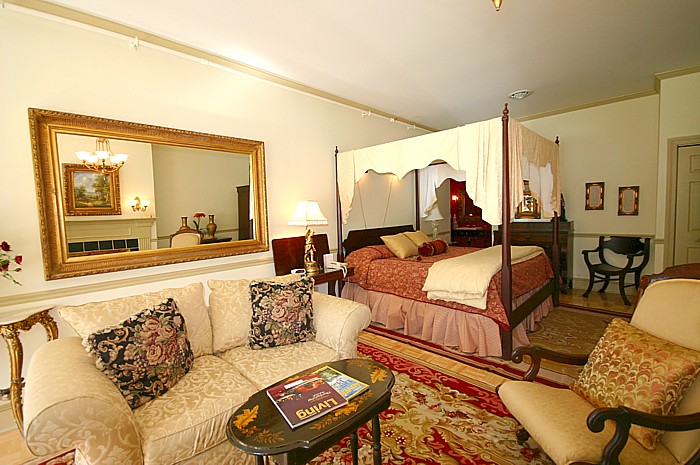
Fifth post, Every year we volunteer at the chamber booth, we love doing it because we meet so many people. Etc.
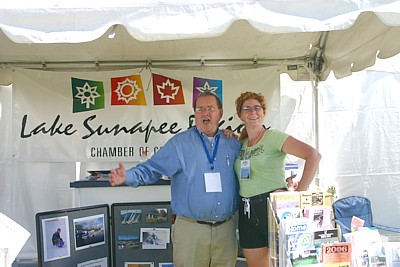
I find it easiest when you are ahead of this to split your posts into topics/themes and put them in different documents. I like to use Google Docs for this https://www.google.com/docs/about/ so you can create both folders for the documents and associated folders, but you can also have one central document (ie your marketing schedule) linking to multiple sub-documents.

I also like to keep an online document in Google Sheets that link directly to websites or online tools that I use very frequently. Yes you can bookmark things, but I gave up when I had hundreds of things bookmarked and even putting bookmarks into folders was a pain because you had to remember which folder they were in. Using the Google docs suite (hey it’s free) to help get organized can be very useful for doing your online marketing. It is pretty much just like MS Office but even a bit more simplified.

I do not know which direction things will take us in, but learning more about social media, how to use the platforms, have a strategy can be useful for any type of business, so if you end up going from innkeeper to realtor or another profession at some point, these are all useful transferable skills. In Restore, Engage, Aggregate, De-stress and You for Innkeepers. I added quite a few links to other posts with resources, so if you are looking for something specific you may find it there and if you can’t find it please let me know and I will track something down for you.
Go forth and get ahead so you can get some heads in beds when the time comes. New Hampshire my home state just issued a stay at home order, so at least maybe I’ll get to catch up on some more blogs myself 🙂
And on a very personal note: I would pretty please ask, if people catch grammatical errors on anything I put out, please be kind enough to let me know by email or direct message instead of posting something in a forum. I do run these through grammarly and if time I ask someone else to proof them. I am dyslexic which quite frankly is non of most people’s damn business but getting snarky comments about a phrase “not being grammatically correct” tends to get me down especially when I am trying to help and working a bazillion hours overtime. ☹
by Heather T. | Mar 21, 2020 | Bed and Breakfasts, Blog, Email, Email Marketing, Lodging, Marketing, Operations, Opinion, Social Media
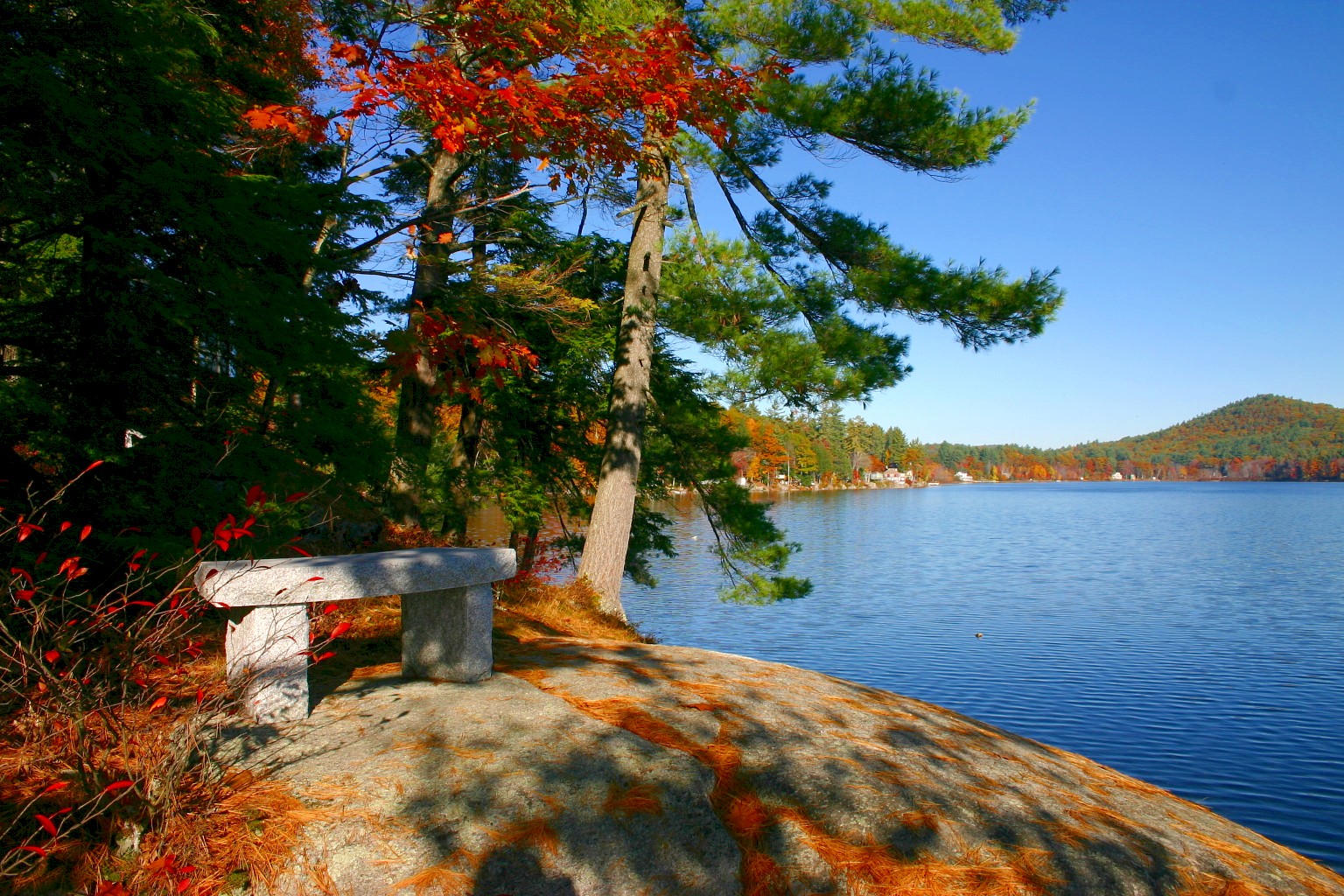 Restore, Engage, Aggregate, De-stress and You = READY
Restore, Engage, Aggregate, De-stress and You = READY
I was talking to one of my innkeeper friends this morning and she said, “It’s funny, we are very depressed because no bookings and everyone has canceled on us for the next few months, not sure how we are going to make it”, but on the bright side, and that I could relate having worked in restaurants for 20 years, this is the first time in 4 years they have had a weekend off.
We ended up talking for a while early this morning and she asked if I could come up with a list of suggestions, not just marketing, but some marketing direction as well as other thoughts, of some things innkeepers could do to be proactive in this very unexpected downtime.
So here goes…….
Are you READY?
In popular Prepper jargon, we have reached S.H.T.F. status (S.H.T.F: Sh*t hits the fan (alternate: stuff hits the fan)) for the innkeeping industry.
I would prefer to think of this as W.A.A.I.T.T. (We are all in this together and “wait” as in this to shall pass).
Well, what to do in downtime? Back in 2012, I had written, Why it pays to sleep around for bed and breakfast owners, I bring this up because I had wanted to do a follow-up article late last year about a place I had stayed at that was top notch but having the owners/innkeepers/management stay in each room would have taken it up even one more notch.
Needless to say, it’s one of several hundred blog posts started and life (as an innkeeper you can relate) and work got in the way of writing it fully. But every property can up their game a bit.
Now: Step One, Take a vacation in your own inn, but use it to fix things, observe things, make them better…..
While your inn is either closed to the public or does not have reservations I would challenge innkeepers to pack their bags for a two-night minimum stay including incidentals, i.e. your big bottle of shampoo and can of shaving cream, go ahead and pack it so you are not using the in-room amenities, but also because it’s not like TSA is going to nab you for bringing anything over 3.4 oz. ?
Pack as if you were going on vacation and also as if you were going on a business trip, cell phones, cords, laptops, the works.
With one prerequisite, you need a notepad in the loo and a notepad in the main bedroom and any other rooms (example a suite with sitting area) with writing utensils, and no it’s not in case you run out of toilet paper. ?
Unpack or get comfortable just like you would if going to stay at another B&B. Then observe, REALLY observe. See those small ding marks on the baseboards? You’ve cleaned and dusted them a million times and noticed them but not “really” noticed them, fix it now.
This is what the notepaper is for, make notes if you can’t fix something right at that very moment and make sure you get back to it and do it this time.
In the bathroom is there room for your makeup case and your partner’s knickknacks on the sink and or shelf? Is the lighting really “that” good?
When you take a shower, can you reach the towel rack easily and is there a place to hang it to dry that works?
I’ve lost track of places that have hooks galore in the bathroom but oddly enough there seems to be some sort of magnetic polarity between the hook and towel as they never seem to want to stick together…… Make notes, now is the time to move that rack, etc.
Breakfast time. Go make breakfast as if you would for guests, then go BE the guest, sit at every seat and every table and eat and observe.
If you have a purse, bring it, is there a place to put it or can you hang it on a chair? If you are going to go out right after, bring your coat, is there room between chair and next chair to put it comfortably? And observe, observe, observe.
This reminds me of a friend who had an inn up here in NH, she had glowing reviews but very occasionally an odd one, not bad just a little odd. We did the dining room flow test (i.e. how people move around and spatial distance between tables and chairs to walk as well as check sightlines, one table of two had a viewpoint from a guest’s perspective right into the little bathroom that adjoined the dining room. What do you see? Test every chair and every point of view.
Wait…..before you take a bite of the food you made, whip out your cell phone and take a slew of photos, be one of those obnoxious Instagrammers.
And make a note, is the lighting good enough for decent photos? If not, what can you do to fix? Bonus, now you have extra photos for marketing……..Food Photography Tips for Bed and Breakfasts might be helpful if you want to up the visual game a bit.
Now go clean up…….or don’t, remember you ARE supposed to be on vacation so do it later. Make it a working vacation. Go take a walk around your neighborhood. I don’t know how many innkeepers I’ve talked to that either have never actually walked to what is around them for a several mile radius or they go out and they walk, but just to walk, i.e. go out and get exercise, but don’t actually take a lot of notice of what is around them.
Take your phone with a full charge and go and take A LOT of pictures, make some notes, actually see and observe the lovely things locally to you that you probably never noticed before. The hidden springhouse covered by wisteria, the small park bench hidden behind the bushes. That great little antique shop (now closed because of the crisis but will reopen) but you never knew or noticed because they don’t have a presence online. Take MORE pictures and don’t forget to wave to your neighbors and share a smile.
Go back to the inn, rinse, repeat for a few days.
Now do a deep clean of the room, wash all linens and suggest bagging them in plastic until the next usage. Document document, document the cleaning of the room so when we get through this and reopen, A. you are all set to go and B. You have proof (take some pictures too) that the room has been deep cleaned and sanitized and that you, the innkeeper were the last person to stay in it.
Now go on vacation in another room, rinse, repeat.
And do some of these other things while you have some downtime in between having weekends off for the first time since you became an innkeeper. I say that tongue in cheek, but I reference what my friend the innkeeper said to me at the start of this post….
- Do some videos, do A LOT of videos, small 1-2 minute clips, virtual tours are good, do a video walkthrough of your inn with commentary or some videos of the area, with commentary. Learn how to leverage Youtube. A great resource for learning Youtube is Youtube Creator Academy, it’s free and it’s super helpful.
- Test some new recipes out, take LOTS of pictures. If you don’t have the ingredients or don’t want to use up food, hey you have to eat anyway, but if you don’t want to experiment now, go research some new ones to try when you are back up and with guests again.
I love to find new recipes or at least in my case, some ideas from:
And many more, both Taste Cooking and Epicurious have great email newsletters with recipe suggestions.
- Create a marketing plan for the rest of the year and start compiling content and pictures. We hopefully will be over this by midsummer or hopefully sooner, what holiday can you target and get pre-prepared for right now?
One of the biggest complaints I hear from innkeepers when talking about planning their marketing and social media, is “we don’t have time”. You do now, take advantage of it!
How to Write a Social Media Strategic Plan for Bed and Breakfasts and Planning Ahead for Your Bed and Breakfast Promotions might be helpful.
- While restaurants and other businesses may be closed or operating in a limited capacity, now is the time to make those good relationships and network, pick up the phone, learn a new skill and try video conferencing. Making those valuable connections and do some deals so that when everything picks back up, your inn and the businesses you and your guests engage with are all ready to rumble.
- Do a deep clean of the inn, and I know some innkeepers are not able to find cleaning supplies, do some outreach to a local restaurant who may be closed or operating in a limited way, do they have some cleaning supplier (or even food if needed) they want to barter or sell?
- Put a plan in place for if this happens again or something like it. While it’s too late to get business interruption insurance, for example, investigate who offers it and rates and be prepared.
- Take some time and educate yourself so you can better help your business and be more informed and less likely to be snowed by an unscrupulous company Google Analytics Academy for instance is free.
And most of all, while we are all supposed to be practicing social distancing, it doesn’t mean you have to practice social isolation. Reconnect with some old friends online, make some new. Start some virtual networking meetings. An innkeeper told me they are now doing virtual tea parties as well as virtual happy hours, sounds like fun to me!
by Heather T. | Mar 9, 2020 | Bed and Breakfasts, Lodging, Marketing, Operations, Opinion
 Threat or Opportunity? I’d say a bit of both. People are scared. I’ll admit I am one of those people that has that nagging feeling in the back of my skull going, “pay attention, pay attention!” and I admit we are prepared to go for several weeks if under self (or otherwise) quarantine if need be. But we prepared for that in advance because we have been through situations like being out of power for more than a week in below zero temperatures several times among other life events. It only takes one life learning lesson to forever be ready for this.
Threat or Opportunity? I’d say a bit of both. People are scared. I’ll admit I am one of those people that has that nagging feeling in the back of my skull going, “pay attention, pay attention!” and I admit we are prepared to go for several weeks if under self (or otherwise) quarantine if need be. But we prepared for that in advance because we have been through situations like being out of power for more than a week in below zero temperatures several times among other life events. It only takes one life learning lesson to forever be ready for this.
Families and businesses need to think about these things, up here in New Hampshire, while we are less likely to have a major earthquake (it could happen) we could have floods, we could have forest fires if we have another severe dry season. A business needs to be prepared. I won’t parrot the hundreds of websites telling you what you should have to stock up on because Google is your best buddy for that, please don’t go and buy up all the toilet paper in the store, others need it to (bonus for innkeepers though you probably already have a pretty good backstock) but regardless of whether the virus scare affects your property or not, this is a good reminder that you should have those supplies in place anyway.
The virus scare if you think about it, isn’t any different from a major tornado, flood, hurricane or earthquake affecting a property. A bit better actually, any of those listed can result in a loss not just of business revenue but of a property itself. At least this is just lost revenue, your property could have washed away in a flood…… Not to make light of this but to put it into perspective.
I think lodging facilities have some opportunities here that they should take advantage of.
One is educating the public about how a B&B is also your home, you as owners/occupiers/innkeepers are good about sanitation over and above a hotel or motel or Airbnb anyway in a normal situation. I’d much rather stay at B&B normally anyway but especially right now rather than a hotel not just by choice but because I’m pretty sure it’s a heck of a lot more sanitary then your average hotel is at the moment.
Two, yes revenue may and probably will go down for the next few months as travelers are canceling vacations and business trips, but this presents a unique opportunity to capture eyeballs online. If I had to self-quarantine and I could not work at home for whatever reason, I will be in the category of what are most people going to be doing and spending time on if stuck at home or elsewhere? On Social Media of course.
The average innkeeper does not have a ton of time to leverage social media because they are working 24/7, think of this as mud season in New England, it’s the slow time of year when you can get caught up with things. Funny enough and lucky enough at least for New Englanders its almost mud season, so the timing could be a lot worse.
Use this opportunity to start pre-writing posts, take more pictures of your breakfast and your property and planning out some marketing for the rest of the year. When and I will stick with “when” everything is sorted out, people will want to get out and resume normal activities, including putting those vacation plans that got canceled back into consideration. Getting in front of their eyeballs when they are literally a captive audience is a great opportunity.
If you don’t know how to use a social media platform, Google is your friend, but so are the channels themselves, there are so many free resources out there to help a business owner better leverage themselves online. Take the opportunity to educate yourself a bit more instead of letting stress overwhelm you, as that doesn’t accomplish anything (aside from weakening your immune system) so one more reason to keep yourself occupied. Again not trying to make light of the situation but being realistic.
So what happens if it doesn’t blow over, what if we have a major pandemic? I don’t know, no one can know but isn’t it better to be proactive for when it does blow over rather than saying if it doesn’t?
There has been a lot of articles reiterating the same thing, wash your hands, sanitize, etc, yes please do all of those but not many articles out there as yet with actual good suggestions on how and what to do to weather this situation. Here are two recent ones of note that I would suggest a read through though because I think they had some good ideas for innkeepers to take note of:
How Can Hotels Survive the Coronavirus? Some good advice if your property is concerned: Six lessons emerge. All of her touchpoints are important but I think Be wary of broad-scale discounting and Don’t cut your marketing budget (and I’ll add to this, even if you are not spending money, the marketing budget is your own time, it’s ROTI, Return on Time Investment, boost that, not cut it) are two things to take special note of.
Does Your Property Have A Coronavirus Strategy? Is another suggested read. Of note here (and he also recommends staying away from the deep discounting) Mandate a “single voice policy” for all employees and departments (yourself) and Provide honest and up-to-date information regarding the situation in the hotel location/destination are both important for a property to note.
ALP has published several blog posts with resources and we will continue to keep it updated with new articles and resources as well.
What else can you do in the interim, I personally love the Beechmere Inn’s approach to this, educating their guests about what the facility is doing to help protect guests, but I also had a question raised by an innkeeper client of mine, “Well what happens if you still have a guest catch the virus (at your inn) or a guest infects others?” Will I get sued?” “Americans are so sue happy, what do you think?”. I’ll be honest I don’t know if someone came to stay at an inn and they were sick with any kind of issue and infected others the impetuous should be on them, but I am not a lawyer.
If you did everything you could to protect guests you did all you could. I’ll take a recent example of the first case diagnosed in New Hampshire for this. The person was told to stay home, he did not and went out and went to a private event and infected at least one if not more (news developing apparently) people, the facility this happened at is handling this well and being proactive. But that kind of thing is just stupidity at its finest and you can only do what you can do.
I don’t believe in fear-mongering and I don’t think it helps if innkeepers are posting all over the place about this, but I don’t think it hurts to help educate guests now and in the future about the safety of your facility, it can be done in a polite and in a no scare tactic way manner.
When life goes back to normal, people are probably still going to stay fairly local, so if you have not yet invested time into researching and targeting the staycation/localcation market, now is a good time to spiff up on that as well. Use this as an opportunity to get your property out there. Run a SWOT analysis on what your B&B can do to mitigate and potentially profit from this long term when we recover from this, and I’ll stick with the “when” not the “if”. In the famous words of Yoda (if he was a marketing guru) “Marketing Never Stop”.
And as an additional note (updated 3/11/2020) I take this very seriously, my own business along with many others besides just the hospitality industry is, and will continue to be, affected. Having several large projects put on hold for an indefinite period of time IS very concerning, but I am going to use this as an opportunity to learn and increase my knowledge of things that can help myself and my clients in the future. If we go down the rabbit hole of depression and inaction, when recovery time comes around, it makes it that much harder to rebound when it’s time.
by Heather T. | Feb 27, 2020 | Bed and Breakfasts, Marketing, Operations, Security
 Many businesses large and small don’t think about creating a social media crisis strategic plan until after the fact. I liken it to not backing up your personal and business information from your computer or computers until after the fire that guts your office or the flood that sweeps away the business.
Many businesses large and small don’t think about creating a social media crisis strategic plan until after the fact. I liken it to not backing up your personal and business information from your computer or computers until after the fire that guts your office or the flood that sweeps away the business.
Planning ahead and at least getting a handle on how you would approach an online crisis before it happens is key to helping your business survive an incident without you having to have a mental breakdown during a situation. This can cause an enormous amount of stress between employees and management or partners and spouses/significant others. Or if you are not that concerned about a full-scale online meltdown but simply want to be better prepared when you have a review or two that is negative and you need a plan in place for how to handle it this can be useful to at least do the basics.
I wrote this out a few years ago for a client’s use and just recently updated it and thought it may be helpful to post it as I see many reputation management companies out there making suggestions but not many give (or any I could find easily at least) actual step by step guidelines and suggestions for what to do. I would guess they want you to pay for it but it’s an important topic that many small businesses may not and do not have in the budget to employ a company to handle and manage this.
You can download this in (PDF) Social Media Strategic Plan for Crisis or MSWord Social Media Strategic Plan for Crisis, and here is the text to review if you would like to peruse what constitutes putting a plan in place. This is an outline to be modified or tweaked as needed and to customize it to your own business. Be safe and be prepared! (and backup your information too!!!) Please feel free to take it and adapt for use, if you are going to copy it and use it for distribution, some credit would be appreciated, if you are going to copy it for your own and sell it for a fee, karma will come around and bite you at some point and you are not a good human being, enough said.
Strategy for Social Media Crisis for “Your Business“
Date Created:
Date last updated:
Facebook-Who has Access?
• Name:
• Role in Organization:
• Facebook Access: Admin Editor Moderator Advertiser Analyst
• Email address:
• Alternative Email Address:
• Phone Number:
• Cell Number:
• Name:
• Role in Organization:
• Facebook Access: Admin Editor Moderator Advertiser Analyst
• Email address:
• Alternative Email Address:
• Phone Number:
• Cell Number:
• Name:
• Role in Organization:
• Facebook Access: Admin Editor Moderator Advertiser Analyst
• Email address:
• Alternative Email Address:
• Phone Number:
• Cell Number:
Twitter-Who has Access?
• Name:
• Role in Organization:
• Team Member: Yes No
• Email address:
• Alternative Email Address:
• Phone Number:
• Cell Number:
• Name:
• Role in Organization:
• Team Member: Yes No
• Email address:
• Alternative Email Address:
• Phone Number:
• Cell Number:
Pinterest-Who has Access?
• Name:
• Role in Organization:
• Access to shared boards: Yes No Yes, which specific ones:
• Email address:
• Alternative Email Address:
• Phone Number:
• Cell Number:
• Name:
• Role in Organization:
• Access to shared boards: Yes No Yes, which specific ones:
• Email address:
• Alternative Email Address:
• Phone Number:
• Cell Number:
Youtube-Who has Access?
• Name:
• Role in Organization:
• Youtube Access: Primary Owner Owner Manager Communications Manager
• Email address:
• Alternative Email Address:
• Phone Number:
• Cell Number:
• Name:
• Role in Organization:
• Youtube Access: Primary Owner Owner Manager Communications Manager
• Email address:
• Alternative Email Address:
• Phone Number:
• Cell Number:
Instagram-Who has Access?
• Name:
• Role in Organization:
• Email address:
• Alternative Email Address:
• Phone Number:
• Cell Number:
• Name:
• Role in Organization:
• Email address:
• Alternative Email Address:
• Phone Number:
• Cell Number:
Google My Business-Who has Access?
• Name:
• Role in Organization:
• GMB Access: Primary Owner Owner Manager Site Manager
• Email address:
• Alternative Email Address:
• Phone Number:
• Cell Number:
• Name:
• Role in Organization:
• GMB Access: Primary Owner Owner Manager Site Manager
• Email address:
• Alternative Email Address:
• Phone Number:
• Cell Number:
Yelp-Who has Access?
• Name:
• Role in Organization:
• Full Access: Yes No
• Email address:
• Alternative Email Address:
• Phone Number:
• Cell Number:
• Name:
• Role in Organization:
• Full Access: Yes No
• Email address:
• Alternative Email Address:
• Phone Number:
• Cell Number:
Other Social Media Channels-Who has Access? For Lodging Add Tripadvisor and OTAs, for other hospitality, any other specific platforms that take reviews.
Cut and paste and put the level of access in if applicable:
• Name:
• Role in Organization:
• Full Access: Yes No
• Email address:
• Alternative Email Address:
• Phone Number:
• Cell Number:
What channels and programs are being used to monitor company reputation online? (Be specific) include costs if applicable.
How often are those channels be checked?
Who is responsible for company online monitoring?
• Name:
• Role in Organization:
• Email address:
• Alternative Email Address:
• Phone Number:
• Cell Number:
• Name:
• Role in Organization:
• Email address:
• Alternative Email Address:
• Phone Number:
• Cell Number:
Define what a crisis is
Single Event VS Massive Online Meltdown: (Define)
Single Event (i.e. a comment) VS Single Event that Snowballs (i.e. it keeps getting larger): (Define)
What constitutes an online crisis to your company (be specific if possible)?
What are some of the repercussions your company can face in the event of an online crisis?
Who will be the point person in responding to online crisis events? (Add contact information here)
Who is a secondary person (in the event the first is not available or additional help is needed)? (Add contact information here)
Who needs to be informed of an online crisis? (Add contact information here) Add secondary people who can make recommendations and directions in the event the key people are not available.
And what are the steps and procedures point people need to follow in order to inform the above?
Who should an employee or company contact get in touch within the event something is seen online that the company needs to address? (Add contact information here)
What steps should a point person take immediately if they are unable to get a response from a key person in charge of decisions?
Examples: Unpublish the Facebook Business Page, Deactivate Twitter account (you have 30 days to recover it), Instagram: temporarily deactivate account, Pinterest: temporarily deactivate account, Youtube: turn off commenting, etc. (major crisis)
Or
Delete posts, pins, boards, videos etc. (minor issue)
++Keep in mind people screenshot, so just deleting something doesn’t necessarily mean the problem will go away if someone saw it and took a screenshot or more it can resurface.
Who is responsible for company online monitoring?
• Name:
• Role in Organization:
• Email address:
• Alternative Email Address:
• Phone Number:
• Cell Number:
• Name:
• Role in Organization:
• Email address:
• Alternative Email Address:
• Phone Number:
• Cell Number:
What are the goals you want accomplished?
Examples: minimize publicity etc.
Damage control doesn’t happen overnight, it takes time and attention to it.
Who can your company reach out to to minimize impact and even out bad reviews or other bad publicity?
Examples: employees, past customers, business supporters, press.
If you have press contacts, who are they and how can a company contact them?
What message in a crisis do you want to be conveying?
What can you put out there to promote and reinforce your brand’s core message?
What are your company’s values?
What is your company’s value proposition to your customer base?
In the event of an online crisis, what guidelines for each platform should your point people be following?
For example: Facebook-delete post or respond (outline a standard response)
Yelp reviews- respond (outline a standard response)
Google My Business reviews- respond (outline a standard response)
What follow-up and addition steps can be taken to mitigate an online crisis?
Press Releases-Who will write, who will have input
Website Statement-Who will write, who will have input
Social Media Statement-Who will write, who will have input
Response templates for reviews: Customize to suit the platform, a Facebook response may not be worded quite the same way as you would word a Google My Business review or post:
Facebook:
Instagram:
Twitter: (keep in mind the 280 character count)
Google:
Yelp:
Other channels:
-Write up an initial response for each, a brief response acknowledging and the situation. This needs to go out as soon as there is a problem.
-Write up follow up responses, there will be two main types, responses to worried concerned people and responses to very unhappy/mad people.
-Create responses for key people as well. A moderator may be posting on behalf of the company owner or manager but it needs to be labeled as a response from that source.
What are some questions that might be asked by people in the event of an online crisis? Write some template responses in how to address these common questions.
What follow-up will you do online and off in the event of an online crisis and for how long?
If a crisis, even a minor one occurs, note what were the results of this, what could you have done differently? What did not go as planned? Did the process for addressing a problem go well? If not what could be tweaked to make it better if something happens in the future?
Reputation Management Checklist for Platforms
Google My Business/Google Maps= Checked Listing
Yes No
No: Check
Claimed Ownership of listing
Yes No
No; Claim
Verified Listing Information is Correct
Yes No
No: Fix
Signed Up for Email Alerts of Reviews
Yes No
No: Sign Up
Yelp = Checked Yelp Listing
Yes No
No: Check
Claimed Ownership of listing
Yes No
No; Claim
Verified Listing Information is Correct
Yes No
No: Fix
Signed Up for Email Alerts of Reviews
Yes No
No: Sign Up
Checked Bing Local Listing http://www.bing.com/businessportal
Yes No
No: Check
Claimed Ownership of listing Yes No
Yes No
No; Claim
Verified Listing Information is Correct
Yes No
No: Fix
Signed Up for Email Alerts of Reviews
Yes No
No: Sign Up
Checked Yahoo Local Listing/Yext
Yes No
No: Check
Claimed Ownership of listing
Yes No
No; Claim
Verified Listing Information is Correct
Yes No
No: Fix
Signed Up for Email Alerts of Reviews
Yes No
No: Sign Up
++Note about Yahoo listings, the site signup is confusing, this article may help https://localmarketinginstitute.com/yahoo-free-business-listing/
Optional Merchant Circle, Manta, Other directories
Other services and monitoring:
Check to see if your business name is taken on social networks:
http://namechk.com/
http://knowem.com/
-Don’t sign up for the service, just use it check (and be cognizant of the fact that they don’t seem to be right 100% of the time)
Free Reputation alerts:
http://google.com/alerts (put in quotes for better return results)
Real time search (twitter) https://twitter.com/search-advanced
Paid:
• https://mention.com/en/
• https://sproutsocial.com/plans-and-pricing/
There are additonal paid monitoring services out there, use your judgement, get a demo, talk to other companies who have used them. Benchmark any reports and results if you pay for it.
by Heather T. | Oct 15, 2019 | Bed and Breakfasts, Email, Email Marketing
 Most Bed and Breakfasts don’t do email marketing, or they do it sporadically with no rhyme or reason behind content, consistency or branding.
Most Bed and Breakfasts don’t do email marketing, or they do it sporadically with no rhyme or reason behind content, consistency or branding.
A few years ago, I wrote a blog post, Email Marketing for Bed and Breakfasts and I find myself over and over again when asked by B&Bs, what are some things that B&Bs need to do for marketing and over and over again I recommend email marketing, so I thought it was time to revisit this.
Why do I say B&Bs need to Own email marketing? Because until they own up to the fact that it’s one of the best ways to retain past guests and convert lookers to bookers, they will continue to spend time, and money on non-targeted marketing that brings them a fraction of the return on both time and money investment.
Yes, I teach social media for a living, so yes I am a big fan of social media marketing, but I also help create and assist with email marketing campaigns for B&Bs and other businesses and I know without a shadow of a doubt that email marketing is one of the very best investments in time and money that innkeepers can spend time on online doing.
Yes, it can be time-consuming (but so is changing sheets and cooking breakfasts).
Yes, it’s a pain to be coming up with new ideas and content (but so is coming up with the same for social media including blog posts).
Yes, there can be a learning curve learning the online channels for email distribution like Mail Chimp and Constant Contact among many others (but it’s not a huge one and all of the online offerings have extensive help pages many including videos).
Yes, starting from scratch can be daunting, especially if you don’t have a base of legitimately sourced emails to start with, (but with so many places to get emails, asking guests if they would like to be added, adding an email subscription form to social media and to your website/blog among other things it doesn’t take much time to build up a decent list).
Yes there can be an expense, (but even using paid offerings (Mailchimp is free for 2,000 Contacts and 10,000 email sends per month, Constant Contact $20.00 on up per month to start as examples) the cost and return of email marketing far outweigh Facebook ads and Boosted posts and pretty much any other social media advertising as well as Google PPC ads).
Having the mindset (and the time) to sit down and tackle doing email for a B&B is what most innkeepers tell me is the biggest challenge. And so they don’t do them. They almost always say, “we know we should be doing them”, but they don’t do them.
I say this to Innkeepers, put a price tag on your time. If you start out with an email list of only 200 people, if you title the email subject line enticingly and put some decent content in, the odds that someone will book a room or an upcoming vacation is exponentially higher than putting some posts out on Facebook to your page with 600 likes (of which under 3% of the people who have liked your page will see the post unless you pay to play, i.e. Boost a post).
If it takes you an hour to write and distribute your email blast and your time is worth to you $50.00 an hour, even $100.00 per hour, and you get 2 bookings for it isn’t it worth it? Once you are comfortable sending emails out, the time it takes decreases dramatically. Once your email list grows, the amount of bookers you get from hooking them in from an email also increases dramatically. This is your time = incoming reservations.
If you haven’t done email marketing before and you have just dabbled, before you jump in headfirst, do some ground laying.
Looking for ideas? Start subscribing to other email newsletters, not just other B&Bs, hotels have some terrific ones they put out (remember they have huge marketing teams working on them), so do other lodging types as well as many other types of businesses. I’ve seen some excellent emails and subject lines from online retailers, similar to hotels, these guys have huge marketing teams as well working on them, lurk and learn, lurk and learn, and stalk thy competition (if they do email marketing),
When you start getting emails in (and yes I know it’s more email) but it’s also market research so well worth it. Make sure you eyeball these on a smartphone as well, some emails look dandy on a desktop but not so good when you are trying to read it in 3 X 6 format, even mobile-friendly templates sometimes don’t render well if photos or text is too small to read easily.
Step one is categorizing them. In Gmail for example, I have a folder for B&B’s newsletters, I have another for Associations, another for restaurants, another for misc. interesting email newsletters and quite a few more. Pretty much all email programs hosted online and off (Outlook etc.) let you put in emails in folders or categories, but these doesn’t get utilized much for marketing research purposes.
Step two is making some notes. Do you like the layouts, do you like the color schemes, what color schemes and layouts can you do that will be in line with your already developed online branding. Don’t read them one by one as they come in, as they come in, just stick them in the folders and look at when you have more then a few to review. You will start to see some trends, some good, some bad, learn from both.
Step three is writing down and bookmarking Subject lines, they don’t have to be B&B related, start keeping track of the emails you get, especially ones from businesses and jot down “why” the subject line got you to open it if it was a marketing email. Did it pique your interest? Did it make you go, “I want to learn more?” Did it make you want to agree (or disagree) with something? Keep track of articles and blog posts too. Bookmark them. A local spa’s email titled last year, “The Secret to the Best Massage You Will Ever Have,” can easily be revamped and re-tweaked. “The Secret to the Best Vacation You Will Ever Have”.
The subject line and pre-header are the keys to a good marketing email and to good open rates. You can spend hours, nay days on perfecting the perfect content for your email newsletter but if you can’t get someone to open the email in the first place, then all was for naught.
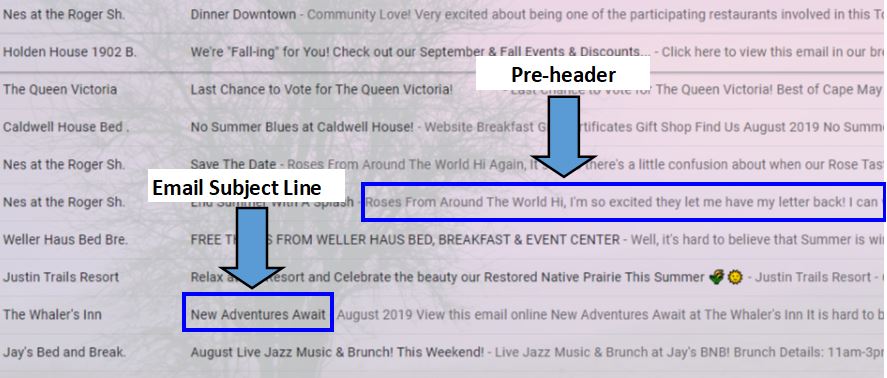
Step four is deciding the content, and by deciding content, figure out what things you are going to touch on, don’t write the content itself for it. Decide whether you are going to feature three topics (maybe four if you wrote a recent blog article you want to draw attention to) or more, I wouldn’t suggest too many more. So an example would be, One: your special offer for the month or a special for an upcoming holiday. Two would be a local event that gets a big draw (coinciding with the special offer you have) and three, a recipe (or another topic). Fini.
Once you have your categories in place, figure out your marketing schedule. 3 weeks to once per month sends seems to work well for B&Bs, 6 weeks between at the very most. Quarterly emails seem to have a much higher rate of unsubscribes because people actually forgot they were subscribed. I’d be cautious with sending out too many emails per month unless they are extremely targeted emails as people get email fatigue and it also leads to high unsubscribe rates unless you have truly excellent, useful content to share every single time. Get out your calendar and make a commitment.
Give yourself a week lead time to put it in your schedule so you can start working on your selected content and portion it out.
The Monday before the date you have scheduled to do the email blast, take 10 minutes and write up your special offer (it may already be written and posted on your website or blog). Make sure you have a good eye catching, legally sourced (or your own or your pbotographer’s) picture ready to go with it.
Tuesday, spend 5 minutes researching that event you are going to include (you may have already gotten the information for your website or blog as well, so you are already done with that aspect), Make sure you have a good eye catching, legally sourced (or your own or your photographer’s) picture ready to go with it, I always recommend buying photos from a legitimate stock photo site is recommended if you don’t have your own to use. I happen to like Dreamstime.com. If you are going to use a photo from the event page, make sure you get permission, preferably in writing.
Wednesday, make sure your recipe (with a photo) is good to go, or whatever other topic you pick. This can change but make sure you have a list of ideas for them in advance (as alternatives) that you can cherry-pick from, sometimes garnering that last idea for an email is what sinks many of them ever getting done.
Thursday, set up your email in a draft and spellcheck it, make sure the links work and send a test draft to yourself, also check the test draft on mobile as many people will be reading it on their smartphones.
Photos with too much detail don’t look great on smartphones so sending a room photo or food photo with too much small detail in it will not get the impact that a simple, clear well lit, uncluttered photo will gather.
Friday, gear up for a busy booked weekend and not have to worry about spending lots of time over the weekend (when you need to spend important time with guests and the actual physical running of your B&B) and be ready to send it out at the day and time of your choosing the following week stress free.
What’s the perfect time to send out a B&B newsletter? That’s a great question I don’t have a perfect answer for, it depends on your guest demographic and geographic bases. If you are an East Coast innkeeper and the majority of your guests (and email addresses) are from drastically different time zones, sending it out on Tuesday at 10 AM may land your email in busy email boxes of people who have not yet started the workday or perhaps arrived in the middle of the night.
A tip when asking for email addresses, get some location information from guests or signup forms (make sure you have a GDPR policy in place too) and segment your mailings.
- A few lodging email titles I’ve bookmarked over years that I just love:
How to Have an Awesome Vacation in 5 Easy Steps
Relaxation Trends for 2020
Tips for Choosing the Right B&B for Your Next Romantic Getaway
Breakfasts that We Love and Why You Will Love Them Too!
Ways to Get Away and Relax Without Breaking the Bank
Wrong Ways to Book a Room and How to Book it the Right Way
Key Benefits of Taking a Vacation in New England
3 Rules For the Making the Most of Your Vacation
10 Point Checklist for Getting Away and Getting Away from it ALL!
B&B or Airbnb, 10 Reasons why to stay at a REAL B&B
How to Create the Perfect Vacation and Remember it Forever
How to Save Yourself from a Terrible Vacation
How to Take Control of Your Time Off
Why REAL B&Bs Beat Airbnbs every time
How a Fabulous Breakfast can Inspire You To Embrace Life
How Our B&B Could Save Your Relationship (this was a hotel originally ?
What No One Tells You About about Vacation Rentals
Where to Find the Secret to Relax and Refresh Your Body, Mind, and Spirit.
Why Not All Vacation Getaways Are Created Equal
The Ultimate Vacation Cheat Sheet
Please innkeepers, go start a regular email blast to past-guests and new ones, you will find the return on it is well worth it.
 So I think I’ve sent these links out including the post ideas several hundred times within the last few weeks so thought if anyone else might find them useful, have at it. 🙂
So I think I’ve sent these links out including the post ideas several hundred times within the last few weeks so thought if anyone else might find them useful, have at it. 🙂
 This has nothing to with innkeeping or restaurants but it might be helpful to anyone who is experiencing sadness, depression or just, in general, being down in the dumps.
This has nothing to with innkeeping or restaurants but it might be helpful to anyone who is experiencing sadness, depression or just, in general, being down in the dumps. After the couple of weeks I’ve had, I said, “I need a laugh, badly” and posted on my personal page “Who’s online and wants to get together for a quick Zoom call and share a funny video together and laugh. I need a laugh right now. Direct Message me and will share my Zoom link”.
After the couple of weeks I’ve had, I said, “I need a laugh, badly” and posted on my personal page “Who’s online and wants to get together for a quick Zoom call and share a funny video together and laugh. I need a laugh right now. Direct Message me and will share my Zoom link”.














 R
R Threat or Opportunity? I’d say a bit of both. People are scared. I’ll admit I am one of those people that has that nagging feeling in the back of my skull going, “pay attention, pay attention!” and I admit we are prepared to go for several weeks if under self (or otherwise) quarantine if need be. But we prepared for that in advance because we have been through situations like being out of power for more than a week in below zero temperatures several times among other life events. It only takes one life learning lesson to forever be ready for this.
Threat or Opportunity? I’d say a bit of both. People are scared. I’ll admit I am one of those people that has that nagging feeling in the back of my skull going, “pay attention, pay attention!” and I admit we are prepared to go for several weeks if under self (or otherwise) quarantine if need be. But we prepared for that in advance because we have been through situations like being out of power for more than a week in below zero temperatures several times among other life events. It only takes one life learning lesson to forever be ready for this. Many businesses large and small don’t think about creating a social media crisis strategic plan until after the fact. I liken it to not backing up your personal and business information from your computer or computers until after the fire that guts your office or the flood that sweeps away the business.
Many businesses large and small don’t think about creating a social media crisis strategic plan until after the fact. I liken it to not backing up your personal and business information from your computer or computers until after the fire that guts your office or the flood that sweeps away the business. Most Bed and Breakfasts don’t do email marketing, or they do it sporadically with no rhyme or reason behind content, consistency or branding.
Most Bed and Breakfasts don’t do email marketing, or they do it sporadically with no rhyme or reason behind content, consistency or branding.
